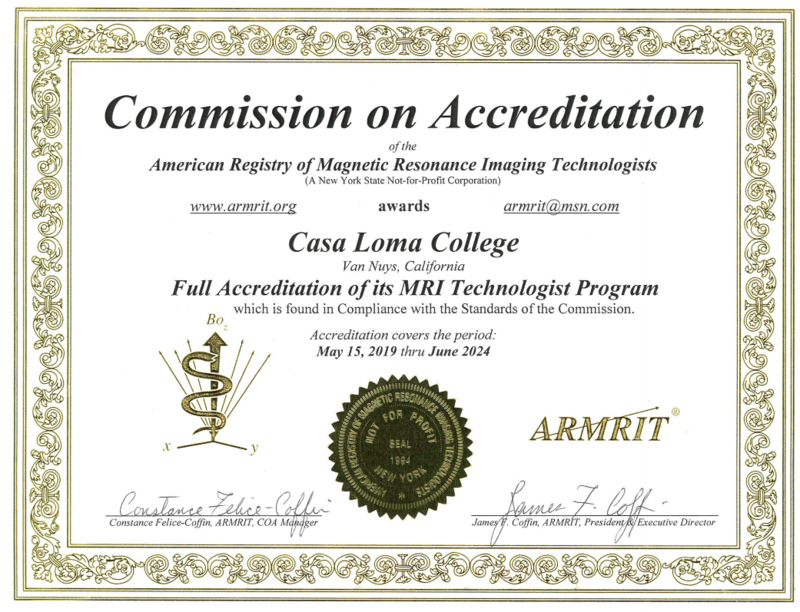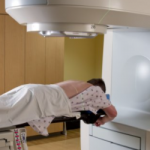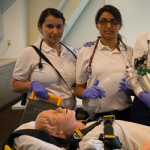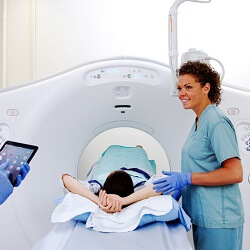What is an MRI Technologist?
An MRI Technologist, also known as a radiologist, specializes in magnetic resonance imaging.
An MRI is a machine that scans the body, creating a detailed image of the inside processes.
As an MRI Technologist, it will be your responsibility to make sure that all patients are comfortable when they go through the MRI machine.
You will also assure that the images come out well and that the doctors are able to interpret them.
There are different types of MRI Technologists, such as:
- Mammogram
- Cardiac
- Brain
Depending on the area of the hospital or health facility in which you work, the type of MRI you complete work with vary.
Duties
An MRI Technologist should have proficiency in the medical field as well as math and science.
This career requires reading and interpreting data and pictures, but there are other daily tasks as well.
These tasks include:
- Consulting with doctors
- Comforting patients
- Explaining procedures to patients
- Documenting procedures
- Deciphering information from patients
- Diagnosing equipment problems
- Evaluating new equipment
- Taking images of the patient’s body
- Assessing imagery
Salary
With a career as an MRI Technologist, you can expect to make a good salary.
At around $77,360 a year for those who have worked as an MRI Technologist for a couple of years, this career can lead to great things in the medical field.
When just beginning your career as an MRI Technologist, a salary closer to $59,110 is to be expected.
However, after many years of experience and certifications, MRI Technologists can make over $100,870 a year in some areas.
Expect to make more money in states like California, where MRI Technologists make around $97,000 a year.
Those who work in states like Michigan or Ohio can expect salaries closer to $65,000 a year.
Whether you work in a small town or a large city, having a career as an MRI Technologist can be very lucrative.
Annually National Average Salary: $86,600
Average Annual Salary by State
| State | Avg. Annual Salary |
|---|---|
| Alabama | $69,040 |
| Alaska | $109,830 |
| Arizona | $90,260 |
| Arkansas | $73,140 |
| California | $114,680 |
| Colorado | $95,680 |
| Connecticut | $94,990 |
| Delaware | $90,470 |
| District of Columbia | $99,330 |
| Florida | $75,850 |
| Georgia | $82,530 |
| Hawaii | $106,610 |
| Idaho | $94,910 |
| Illinois | $85,580 |
| Indiana | $79,770 |
| Iowa | $71,100 |
| Kansas | $76,840 |
| Kentucky | $75,940 |
| Louisiana | $67,840 |
| Maine | $84,960 |
| Maryland | $93,450 |
| Massachusetts | - NA - |
| Michigan | $74,380 |
| Minnesota | $92,330 |
| Mississippi | $67,650 |
| Missouri | $79,330 |
| Montana | $80,750 |
| Nebraska | $77,890 |
| Nevada | $90,760 |
| New Hampshire | $93,330 |
| New Jersey | $98,880 |
| New Mexico | $85,060 |
| New York | $96,900 |
| North Carolina | $79,970 |
| North Dakota | $76,710 |
| Ohio | $77,640 |
| Oklahoma | $79,750 |
| Oregon | $106,620 |
| Pennsylvania | $83,180 |
| Rhode Island | $92,530 |
| South Carolina | $79,980 |
| South Dakota | $66,950 |
| Tennessee | $73,170 |
| Texas | $84,770 |
| Utah | $85,500 |
| Vermont | $97,880 |
| Virginia | $87,770 |
| Washington | $109,750 |
| West Virginia | $75,810 |
| Wisconsin | $85,230 |
| Wyoming | $81,600 |
| Puerto Rico | $40,190 |
Annual Average Salary: Top 5 States
The top earning state in the field is California, where the average salary is $114,680.
These are the top 5 earning states in the field:
* Employment conditions in your area may vary.
How to Become a Medical Technologist
Step 1 Enter a Program
Dealing with MRIs and other medical technology can be difficult, that’s why it is suggested to earn some type of education for this career.
Many people who are interested in working as an MRI Technologist will enter into an MRI Tech program, which can be found both online and in-person at local community colleges or other medical facilities around the United States.
Most programs take around a year to complete and often include an internship.
There are even some MRI Tech programs that will allow you to earn an Associate’s degree, these often take about two years to finish.
Earning an Associate’s degree can be a big step in your journey into the medical field.
With an Associates degree in radiologic technology, you can expect to take many science and math classes, as well as:
- Anatomy and Physiology
- Healthcare Practices
- Patient Procedures
- MRI Evaluations
- Medical Imaging
There are also Associates degree programs available online but be sure to do any lab or clinical work in person to gain hands-on experience.
Do you want to take a step further as an MRI Technologist?
Obtaining a Bachelor’s degree can open so many more doors in this field.
With this type of degree, you can dedicate your focus on a specific area of MRI Technology or even nuclear medicine.
A Bachelor’s degree takes about four years to complete, but often credits can transfer from an Associate’s degree.
Step 2 Become Certified
Once you gain some type of education, whether you just want to enter a one year program or go to school for four years to earn a Bachelor’s degree, you will need to become certified to work as an MRI Technologist.
Certification not only shows employers that you are competent in the job, but it also shows patients that you can be trusted in their most worrisome times.
You can obtain one of two certifications to become a Certified MRI Technologist through either the of these associations:
- American Registry of Radiologic Technologists
- American Registry of Magnetic Resonance Imaging Technologists
Those who want to gain certification through the ARRT will need to have an additional year or two of training through an accredited program.
Once the program is finished, you will need to take an exam in order to be certified.
While those who gain certification through the ARMRIT will need to take an exam in order to become certified.
Step 3 Gain Experience
Oftentimes, when an MRI Technologist is in school, they will gain hands-on experience in the workplace through internships, clinical workshops, and lab work.
This means you won’t start your career completely in the dark.
However, after earning a degree and becoming certified, you will need to find a job.
There are several places to look for experience as an MRI Technologist:
- Imaging centers
- Hospitals
- Urgent care centers
- Intensive care
- Doctor’s offices
It’s even possible to work as a Travel MRI Technologist, where you can work in different facilities every day.
For further specialization or other certifications, it’s likely that you will need to have at least two years of experience as an MRI Technologist to be eligible.
Step 4 Further Your Career
After several years of working as an MRI Technologists, you may be interested in furthering your career.
There are opportunities all over the United States for MRI Technologists, but some other related careers include:
- Radiation Technologist
- Radiation Therapist
- Nuclear Medicine Technologist
- Diagnostic Medical Sonographer
- Veterinary Technologist
Other ways to further your career as an MRI Technologist are to stay on top of your education and become specialized in a field of your choice.
Those who further their education, become recertified, and find a niche will likely make more money and have a more satisfying career than those who don’t better themselves.
Furthering your education could include taking classes, going to a seminar, or even reading books on MRI technology.
Popular Programs
Education
There are many choices when it comes to the type of education you can receive to become an MRI Technologist.
Due to the nature of the career, it is required to have some type of training before entering the workforce.
However, the type of education you receive is up to you.
Some aspiring MRI Technologists go through a one year program, while others earn an Associate’s degree or even a Bachelor’s degree.
Depending on the type of program, this can take anywhere from one to four years to complete.
Programs can be found online, or even at local community colleges and universities.
With a one-year program, you can expect to learn the basics of MRI technology.
Ensure that the program you enroll in is accredited by the:
- American Registry of Radiologic Technologists
- American Registry of Magnetic Resonance Imaging Technologists
Also, be sure that your program will allow you to take the ARRT certification exam, at least.
Two-year programs that finish with an Associate’s degree are a common route for MRI Technologists.
This is because you will receive a formal education, as well as work an internship and gain clinical experience in the field.
Some of the courses that are in a typical Associates degree program include:
- Biology
- Patient Care
- Radiographic Procedures
- Pathophysiology
- Biochemistry
- Diagnostic Concepts
Earning an Associate’s degree will allow you to be eligible to take either certification exam from the accredited associations.
There are other MRI Technologists who choose to earn a Bachelor’s degree to fulfill their career goals.
Having a Bachelor’s degree can provide many new career opportunities for MRI Technologists.
Most Bachelor’s degrees take around four years to complete, but often Associate’s degree credits can be added to this.
There will be a large focus on science in this degree program.
You should expect to see courses like:
- Advanced Image Analysis
- Clinical Research Methods
- Human Anatomy
- Medical Terminology
- Medical Ethics
- Diagnostic Healthcare
With a Bachelors degree, you can expect to be eligible for advanced careers including:
- Radiology Administrator
- Pediatric Radiographer
- Cardiovascular Technologist
Video About The Career
Certification and Licensing
Once you finish an accredited MRI Technology program and have a certificate or degree, you will be eligible to take one of two exams from one of the accredited associations for MRI Technologists:
- American Registry of Radiologic Technologists
- American Registry of Magnetic Resonance Imaging Technologists
The ARRT offers the Magnetic Resonance Imaging Certification which will show employers and patients that you are competent in this career.
The requirements for this certification are:
- Have an Associates degree or higher
- Complete an ARRT approved certificate program
After you do both of those things, you will then be required to take an exam.
Certificate programs can take anywhere from one to two years to complete.
More information can be found on the ARRT website about the specifics of the accredited programs.
The exam is competency-based, which means the more questions that you answer correctly, the fewer questions you will need to answer in total.
You can find several topics on this exam:
- Patient Care
- Safety
- Image Production
- Procedures
The exam should take around two hours to finish.
Once you pass the exam, you will be considered a certified MRI Technologist.
The ARMRIT MRI Certification is a little more intense.
The exam requires an Associate’s degree or a Bachelor’s degree, you cannot take this exam with a program certificate.
Numerous subjects are covered on this exam as well, including:
- MRI Options
- Image Resolution Decisions
- Image Prescription Decisions
- General Imaging Options
MRI Technologists must have a certification from one of these associations in order to gain employment in the United States.
It doesn’t matter which association you choose, but employers can tell you which one that they prefer.
Recertification must happen every five years.
This can be done by pursuing further education or retaking the exam.
Exams cost anywhere from $250 to $400, depending on where you take it.
Certification Example:

Average Training Program Duration: 1-2 Years
When pursuing the ARRT certification, aspiring MRI Technologists will need to enroll in an additional program to become certified.
This program can take anywhere from 1 to 2 years to complete but will be determined by the ARRT association.
The program will be chosen based on where you are located, and the opportunities around you.
Most programs take around a year and can teach students about the intricacies of MRI Technology.
Once you complete this program, you will then need to take the exam in order to become ARRT certified.
Job Outlook
We need MRI Technologists now more than ever, and this need will continue to grow over the next decade.
This career looks to grow in necessity about 8 percent over the next ten years.
This is faster than many occupations within the medical field.
There are several reasons for this growth, including the aging baby boomer population.
This population will need new medical assistance, but they will also be retiring from the workforce, creating more jobs for new MRI Technologists.
Those who work in larger populations with bigger hospitals and medical facilities will likely find easier career opportunities than those working in small towns.
Employment Growth Projection: 8%
2020
2030
That's a higher than average projected growth of 3,300
Should You Become an MRI Technologist?
Overall Satisfaction: Medium

If you are looking to become an MRI Technologist to find easy work, then you are searching in the wrong place.
This career is hard, the stress level can often be overwhelming, and sometimes the hours seem endless.
There isn’t much upward mobility in this career either, unless you continue your education and earn a Bachelor’s degree.
One of the things that MRI Technologists love about their job is working with patients and making their lives better.
This career is not one of the most satisfactory, but it will lead you toward great things in the medical field.
Average Salary: High

Most MRI Technologists in the United States will make around $77,360 annually.
Gaining certifications and finding your niche as an MRI Technologist can lead to a salary of over $100,870 in some areas.
When you are just beginning your career, the salary you should expect will be around $59,110 on average.
Working in areas with larger populations, or in areas with more elderly people, can create a higher salary for an MRI Technologist.
This is because you will see more patients throughout the day, increasing the demand for this career.
Working as an MRI Technologist can make you quite successful, as it doesn’t require as much education as many other careers in the medical field.
Job Growth Outlook: High

Those interested in working as an MRI Technologist will be happy to hear that this career is not going anywhere anytime soon.
In fact, this career will grow around 9 percent over the next ten years.
Working as an MRI Technologist is a rewarding career, especially now that the need for MRI Technologists is on the rise.
The baby boomer population is a large reason why the career will grow, both because this generation will need more medical care, and they are also retiring from the workforce.
Education Duration: 1-2 Years

In order to be an MRI Technologist, you must have a solid education.
Most MRI Technologists will earn a certificate through a program or earn an Associate’s degree.
These programs can be done online or in person, often at community colleges or medical programs through hospitals.
Often, aspiring MRI Technologists can find programs that take around a year to complete.
Others work toward an Associate’s degree, which takes around two years to finish.
Depending on the type of program you enroll in, it can take anywhere from 1-2 years to become an MRI Technologist.
Personal Skills Needed

Working as an MRI Technologist can be sensitive due to the nature of the career.
That’s why it takes an empathic person with compassion for others to do well in this role.
Other skills that will help you gain success as an MRI Technologist include:
- Analytical skills
- Communication skills
- Time-management skills
- Ability to work alone or with a team
- Knowledge of the medical field
- Critical thinking skills
- Math skills
- Ability to multi-task
- Stress management skills
- Writing skills
- Manual dexterity
- Organizational skills
Frequently Asked Questions
What is the average salary of an MRI Technologist?
Annually on average, an MRI Technologist can expect to make around $77,360.
If you are just beginning your career as an MRI Technologist, fresh out of school, you should expect a salary closer to $59,110 to begin.
Once you earn certifications, gain more experience, and become educated even further, you may be surprised to know it’s possible to earn up to $100,870 a year as an MRI Technologist in some areas.
Those who work in larger states like California or Texas will likely make more money than people working in Rhode Island or New Jersey, depending on population sizes.
How long does it take to become an MRI Technologist?
There are several types of programs that you can enter to become an MRI Technologist.
The shortest programs take about one year to finish.
Longer programs that provide an Associate’s degree can take around two years to finish.
Then there are Bachelor’s degrees that can take about four years for full-time students.
If you are interested in becoming an entry-level MRI Technologist, start a one year program.
Earning a degree will put you in line for more career opportunities and promotions.
What does an MRI Technologist do?
An MRI Technologist helps patients who need to get Magnetic Resonance Imaging done.
AN MRI machine can create images of different parts of a person’s anatomy.
Helping the patient into the machine, explaining the procedure, and taking images are required from the MRI Technologist.
Typically in this career, you will consult with doctors to determine diagnoses for patients and help to assess images.
What is the demand for MRI Technologists?
Due to the aging baby boomer population, there will be an increase in career opportunities for MRI Technologists.
This generation shouldn’t be to blame for the entire spike in job openings, as advancements in technology have made it easier for MRI Technologists and the medical field as a whole.
If you plan to become an MRI Technologist, now is the time to begin your journey.
This career will grow around 9 percent over the next ten years, that’s much higher than many other careers in the same field.
How much does it cost to become an MRI Technologist?
The cost to become an MRI Technologist can depend on the type of program entered.
For one year programs, the cost can be as little as $1,200 or as much as $5,000.
If you are interested in earning an Associate’s degree, this can take around two years and cost about $10,000 to $15,000.
More education means more career opportunities for MRI Technologists, and that is why those who are serious about this career earn a Bachelor’s degree.
This can cost anywhere from $30,000 to $45,000, depending on the university or college attended.
It can cost from $1,200 to $45,000 to become an MRI Technologist.
MRI Technologist Resources
- 14 Pros and Cons of Being an MRI Technologist
- How Much Does MRI Technologist School Cost?
- Online MRI Technologist Training Programs
More Medical Careers
| Career | |
|---|---|
 | Certified Nursing Assistant Working as a Certified Nursing Assistant is an entry-level role that will give you hands-on experience when you are ready to take the next step in your medical career. |
 | Dental Assistant Dental assistants help dentists to provide patient care, keep records, and care for the dental equipment. |
 | Dental Hygienist Dental hygienists take care of cleaning teeth to promote hygiene and help avoid cavities and gum problems. |
 | Dialysis Technician Dialysis technicians maintain and monitor dialysis equipment, and also act as primary caregivers for patients undergoing dialysis treatment. |
 | Dog Groomer Dog groomers attend to grooming dogs, usually at dog salons or big pet-related chain stores. |
 | Healthcare Administrator Healthcare administrators – also known as healthcare executives or health services managers – are responsible for the planning, direction, and coordination of medical and health services. |
 | Home Health Aide Home health aides provide home care to individuals who require assistance in their day-to-day living. |
 | Licensed Practical Nurse (LPN) Licensed Practical Nurses provide basic nursing care to patients and work with Registered Nurses and Doctors. |
 | Medical Assistant Medical assistants support the work of physicians, nurses, and other health professionals. |
 | Medical Biller and Coder Medical billers and coders manage, organize, and code various health information data. |
 | Medical Technologist Medical laboratory technologists collect bodily samples and conduct tests to analyze those samples. |
 | Medical Transcriptionist Medical transcriptionists go over voice recordings to convert them into written texts. |
 | Nutritionist As a Nutritionist, you’ll be tasked with creating meal plans, counseling, and understanding dietary restrictions for all types of clients. |
 | Patient Access Representative The work involves helping people to orient themselves to the space and everything that is going on. |
 | Patient Care Technician Patient care techs work directly with patients helping them with daily activities and assist the medical staff by measuring and monitoring the patients' vital signs among other tasks. |
 | Pharmacy Technician Pharmacy technicians provide patients with medications through prescription or over the counter. |
 | Phlebotomist As a Phlebotomist, it will be your responsibility to take blood samples from patients and send them to the lab for further testing. |
 | Physical Therapist Assistant Physical therapist assistants provide physical therapy services to patients and aide to physical therapists. |
 | Professional Recovery Coach A professional recovery coach is a life coach who works with someone during their addiction recovery process. |
 | Radiation Therapist Allied health provisional who specializes in radiation oncology treatments. |
 | Registered Health Information Technician Registered Health Information Technician (RHIT) help store and verify accuracy of health records as well as analyze patient data. |
 | Registered Nurse (RN) Registered Nurses provide hands-on patient care in various settings, mainly hospitals, and clinics. |
 | Respiratory Therapist Respiratory therapists treat and care for patients who experience breathing difficulties. |
 | Sterile Processing Technician A sterile processing technician is a healthcare professional who is responsible for preparing, sterilizing, maintaining, packaging, and storing medical tools and equipment used in surgical and other medical procedures. |
 | Surgical Technologist Surgical technologists – also known as operating room techs – prepare operating rooms and assist doctors and nurses during surgical procedures. |
 | Vet Office Manager Veterinary office managers work to make sure that the daily operations run smoothly and efficiently at veterinary hospitals or veterinary clinics. |
 | Veterinary Assistant Veterinary Assistants work closely with Veterinarians to handle routine animal care. |
 | Veterinary Technician Veterinary Technicians assist veterinarians as well as diagnosing and treating animals, mostly in private clinics. |
 | EKG Technician EKG technicians test and monitor the cardiovascular system. |
 | EMT Trained emergency medical technician that arrives at the scene to provide medical services such as resuscitation. |
 | Optician Opticians are technicians and salespersons at the same time who spends most of their day talking to customers, reading prescriptions written by doctors, and dispensing glasses and lenses. |
 | Ultrasound Technician Ultrasound technicians aid physicians in monitoring and diagnosing patients through the use of ultrasonic imaging technology. |
 | X-Ray Technician X-Ray Technicians are medical imaging professionals who use technology to visualize the inside of our bodies. |













